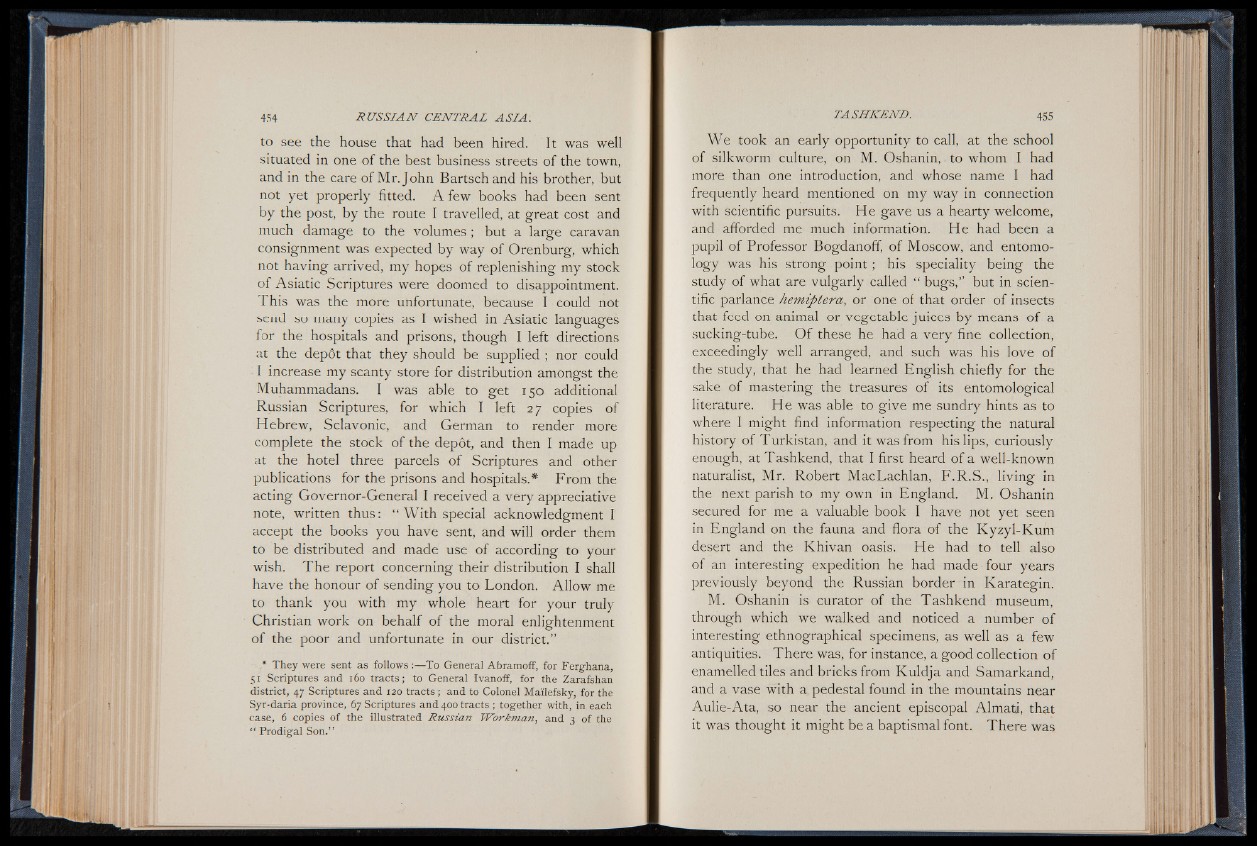
to see the house that had been hired. It was well
situated in one of the best business streets of the town,
and in the care of Mr. John Bartsch and his brother, but
not yet properly fitted. A few books had been sent
by the post, by the route I travelled, at great cost and
much damage to the volumes ; but a large caravan
consignment was expected by way of Orenburg, which
not having arrived, my hopes of replenishing my stock
of Asiatic Scriptures were doomed to disappointment.
This was the more unfortunate, because I could not
send so many copies as I wished in Asiatic languages
for the hospitals and prisons, though I left directions
at the dépôt that they should be supplied ; nor could
I increase my scanty store for distribution amongst the
Muhammadans. I was able to get 150 additional
Russian Scriptures, for which I left 27 copies of
Hebrew, Sclavonic, and German to render more
complete the stock of the dépôt, and then I made up
at the hotel three parcels of Scriptures and other
publications for the prisons and hospitals.* From the
acting Governor-General I received a very appreciative
note, written thus: “ With special acknowledgment I
accept the books you have sent, and will order them
to be distributed and made use of according to your
wish. The report concerning their distribution I shall
have the honour of sending you to London. Allow me
to thank you with my whole heart for your truly
Christian work on behalf of the moral enlightenment
of the poor and unfortunate in our district.”
* They were sent as follows :— To General Abramoff, for Ferghana,
51 Scriptures and 160 tracts; to General Ivanoff, for the Zarafshan
district, 47 Scriptures and 120 tracts ; and to Colonel Mai'lefsky, for the
Syr-daria province, 67 Scriptures and 400 tracts ; together with, in each
case, 6 copies of the illustrated Russian Workman, and 3 of the
“ Prodigal Son.”
We took an early opportunity to call, at the school
of silkworm culture, on M. Oshanin, to whom I had
more than one introduction, and whose name I had
frequently heard mentioned on my way in connection
with scientific pursuits. He gave us a hearty welcome,
and afforded me much information. He had been a
pupil of Professor Bogdanoff, of Moscow, and entomology
was his strong point ; his speciality being the
study of what are vulgarly called “ bugs,” but in scientific
parlance hemiptera, or one of that order of insects
that feed on animal or vegetable juices by means of a
sucking-tube. O f these he had a very fine collection,
exceedingly well arranged, and such was his love of
the study, that he had learned English chiefly for the
sake of mastering the treasures of its entomological
literature. He was able to give me sundry hints as to
where I might find information respecting the natural
history of Turkistan, and it was from his lips, curiously
enough, at Tashkend, that I first heard of a well-known
naturalist, Mr. Robert MacLachlan, F.R.S., living in
the next parish to my own in England. M. Oshanin
secured for me a valuable book I have not yet seen
in England on the fauna and flora of the Kyzyl-Kum
desert and the Khivan oasis. He had to tell also
of an interesting expedition he had made four years
previously beyond the Russian border in Karategin.
M. Oshanin is curator of the Tashkend museum,
through which we walked and noticed a number of
interesting ethnographical specimens, as well as a few
antiquities. There was, for instance, a good collection of
enamelled tiles and bricks from Kuldja and Samarkand,
and a vase with a pedestal found in the mountains near
Aulie-Ata, so near the ancient episcopal Almati, that
it was thought it might be a baptismal font. There was